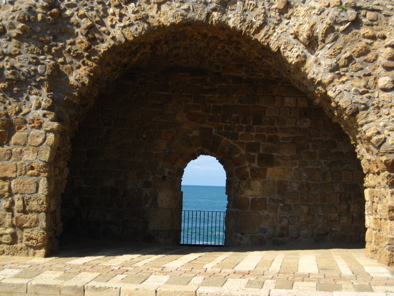Glimpses of an Imprisonment Lasting Forty Years (continued)
“Immediately upon his arrival, Árif Bey proceeded to denounce me and tried to get proof strong enough to warrant sending me to Fizán, or throwing me into the sea. Fizán is a caravan station on the boundary of Tripoli where there are no houses and no water. It is a month’s journey by camel route from ‘Akká.
“The committee twice sent for me to hear what I had to say in my own defence and twice I sent back word: ‘I know your purpose, I have nothing to say.’
“This so infuriated Árif Bey that he declared he would return to Constantinople and bring back an order from the Sulṭán to have me hanged at the gate of ‘Akká. He and his committee set sail with their report con- taining the following ac- cusations:—‘Abdu’l-Bahá is establishing a new nation of which he is to be the king; ‘Abdu’l-Bahá is uplifting the banner of a new religion; ‘Abdu’l-Bahá has built or caused to be built fort- ifications in Haifa, a neigh- bouring village, and is buy- ing up all the surrounding lands.’
“About this time an Italian ship appeared in the harbour sent by order of the Italian Consul. It had been planned that I was to escape on it by night. The Bahá’ís in ‘Akká implored me to go but I sent this message to the captain: ‘The Báb did not run away: Bahá’u’lláh did not run away; I shall not run away, so the ship sailed away after waiting three days and three nights.
“It was while the Sulṭán’s committee of investigation was homeward bound that the first shell was dropped into ‘Abdu’l-Ḥamíd’s camp and the first gun of freedom was fired into the home of despotism. That was God’s gun,” said ‘Abdu’l-Bahá, with one of his wonderful smiles.
“When the committee reached the Turkish capital, they had more urgent things to think of. The city was in a state of uproar and rebellion, and the committee, as members of the government staff, were delegated to investigate the insurrection. Meanwhile the people were establishing a constitutional government and ‘Abdu’l-Ḥamíd was given no chance to act.”
The Release
“With the advent of the Young Turks’ supremacy, realized through the Society of Union and Progress, all the political prisoners of the Ottoman Empire were set free. Events took the chains from my neck and placed them about Hamíd’s; ‘Abdu’l-Bahá came out of prison and ‘Abdu’l-Ḥamíd went in!”
“What became of the committee?” asked someone, breaking the deep silence that followed the recital of this thrilling page of history. “Árif Bey,” continued ‘Abdu’l-Bahá, “was shot with three bullets, the general was exiled, the next in rank died, and the third ran away to Cairo, where he sought and received help from the Bahá’ís.”
“Will you tell us how you felt while in prison and how you regard your freedom?” I asked. “We are glad that you are free.”
“Thank you,” he said graciously, and continuing—
“Freedom is not a matter of place. It is a condition. I was thankful for the prison, and the lack of liberty was very pleasing to me, for those days were passed in the path of service, under the utmost difficulties and trials, bearing fruits and results.
“Unless one accepts dire vicissitudes, he will not attain. To me prison is freedom, troubles rest me, death is life, and to be despised is honour. Therefore, I was happy all that time in prison. When one is released from the prison of self, that is indeed release, for that is the greater prison. When this release takes place, then one cannot be outwardly imprisoned. When they put my feet in stocks, I would say to the guard, ‘You cannot imprison me, for here I have light and air and bread and water. There will come a time when my body will be in the ground, and I shall have neither light nor air nor food nor water, but even then I shall not be imprisoned.’ The afflictions which come to humanity sometimes tend to centre the consciousness upon the limitations, and this is a veritable prison. Release comes by making of the will a Door through which the confirmations of the Spirit come.”
This sounded so like the old theology that the modern in me rose doubting if the discipline could be compensated for by the effort. “What do you mean by the confirmations of the Spirit?”
“The confirmations of the Spirit are all those powers and gifts which some are born with (and which men sometimes call genius), but for which others have to strive with infinite pains. They come to that man or woman who accepts his life with radiant acquiescence.”
Radiant acquiescence—that was the quality with which we all suddenly seemed inspired as ‘Abdu’l-Bahá bade us good-bye.
It was a remarkable experience, hearing one who had passed along the prison path for forty years declare “There is no prison but the prison self;” and it drove conviction to one’s mind as this white-robed messenger from the East pointed the way out,—not by the path called “Renunciation,” but “Unattachment;” Radiant Acquiescence—the Shining Pathway out of the “greater prison of self” as ‘Abdu’l-Bahá so beautifully terms those bars that keep us from our fulfillment.
Isabel Fraser1
Notes
The photographs in this article are used with the kind permission of Ezra Freelove.
http://freelovephotography.com/
1. As published in ‘Abdu’l-Bahá, ‘Abdu’l-Bahá in London (UK Bahá’í Publishing Trust, 1982 reprint), pp. 114-21.
